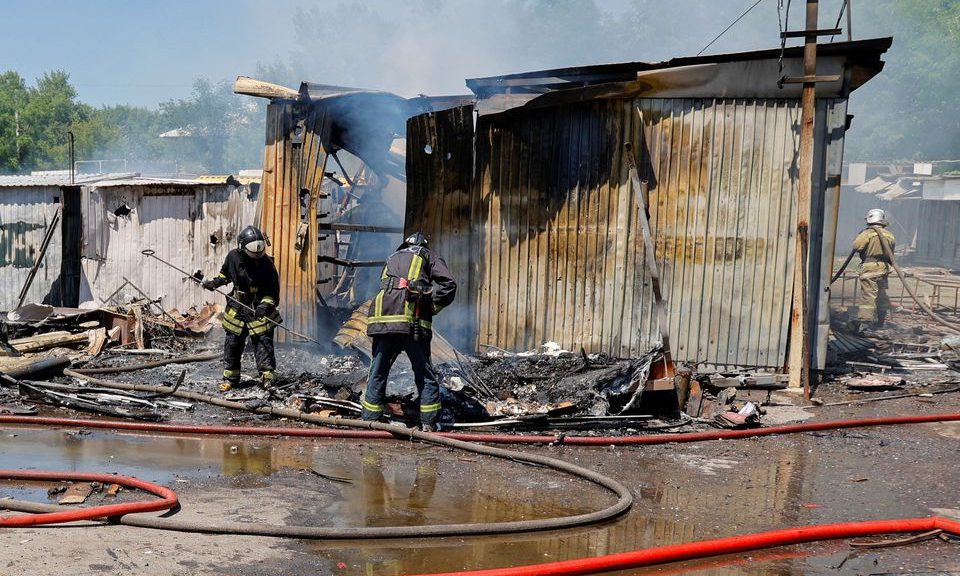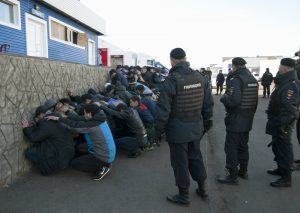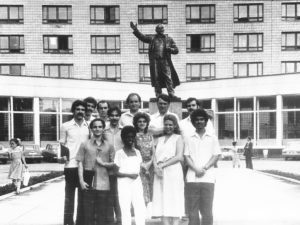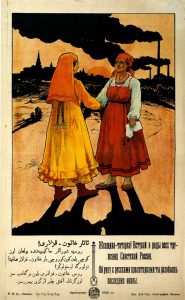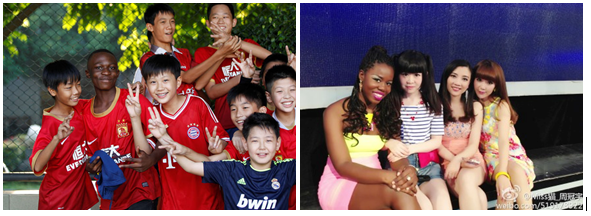Photo Above: Firefighters put out flames in buildings in the central Maisky market in the eastern Ukrainian city of Donetsk hit by shelling from Ukrainian forces on 13 June. Five people were killed in the Ukrainian attack including one child. Residential areas, hospitals and markets in the city, which is controlled by pro-Russian separatists, have been repeatedly hit by Ukrainian artillery attacks over the last eight years. Such attacks have escalated this month causing dozens of civilians to be killed.
Photo credit: Stringer/Reuters
Don’t Let the Western Capitalist Rulers
Reinforce Their Tyranny Over the World!
Defeat U.S., British, Australian
and German Imperialism’s Proxy
War to Weaken and Stifle Russia!
26 June 2022: Last month U.S. president Joe Biden signed a law granting Ukraine $US40 billion in military supplies and economic aid in order to sustain its war against Russia. The package is so huge that the direct military component of it amounts to almost five times Ukraine’s total 2020 defence expenditure! Many U.S. allies, including Britain, Denmark, Germany, France, Poland, Norway, Estonia, Sweden and the Czech Republic have also been rapidly increasing their military support to Kiev. Here, the former Morrison Liberal government and the current Labor Albanese government have sent Ukraine’s authoritarian regime hundreds of millions of dollars of military equipment including howitzers (long-range artillery) and dozens of armored vehicles.
The level of backing to Ukraine by the Western imperialist ruling classes has risen dramatically since the early weeks of the Russian intervention. In our statement written thirteen days after the Russian invasion, we stated that: “The West’s aid to Ukraine is not at a level aimed at achieving total Ukrainian victory but rather at bleeding Russia over a long period. Thus, much of the weaponry that the Western imperialists have supplied to Ukraine, like hand-held missiles and rockets, is most suitable for a guerilla war against Russia… Currently therefore, we cannot say that the large amounts of Western support to Ukraine is equivalent to the U.S., NATO and Australia being directly at war with Russia.” We qualified that observation by stating that, “It is, of course, possible that the West could qualitatively change their level of assistance.” Well, what we labelled then as a possibility has now become the reality. High on their own propaganda that they have been feeding the masses that Kiev is actually winning the war, Washington and its allies have been pumping the Ukrainian regime’s war campaign with ever greater military assistance. In the wake of the U.S. congress passing the $US40 billion aid package to Ukraine, the politically connected American think tank, Centre for Strategic & International Studies, stated that:
“For the first five weeks of the conflict, military support to Ukraine averaged about $30 million a day (excluding economic and humanitarian support and the costs of U.S. forces deployed to Europe for the crisis). In April, a series of $800 million aid packages implied a level of $100 million a day. This package increases the aid level to $135 million a day.”
It is not just the level of military assistance that has changed but the character of it. Washington and Co. have been sending ever heavier and more sophisticated weapons to the Ukrainian regime. This includes anti-aircraft batteries, advanced long-range anti-ship missiles, drones, tanks and self-propelled howitzers. Most notably, this month the Biden administration started sending the Ukrainian regime advanced HIMARS multiple-launch guided rocket systems that have much greater range than Ukraine’s existing artillery systems. Meanwhile, as well as providing crucial intelligence assistance to Ukraine and training large numbers of Ukrainian troops in bases in Germany, Britain and France, Western imperialist militaries now have troops on the ground in Ukraine directly training and organising Kiev’s forces. Several Western mainstream media outlets reported that in mid-April British special forces moved into Kiev to assist the Ukrainian military. CIA spies are also reportedly now operating within Ukraine as are U.S. commandos.
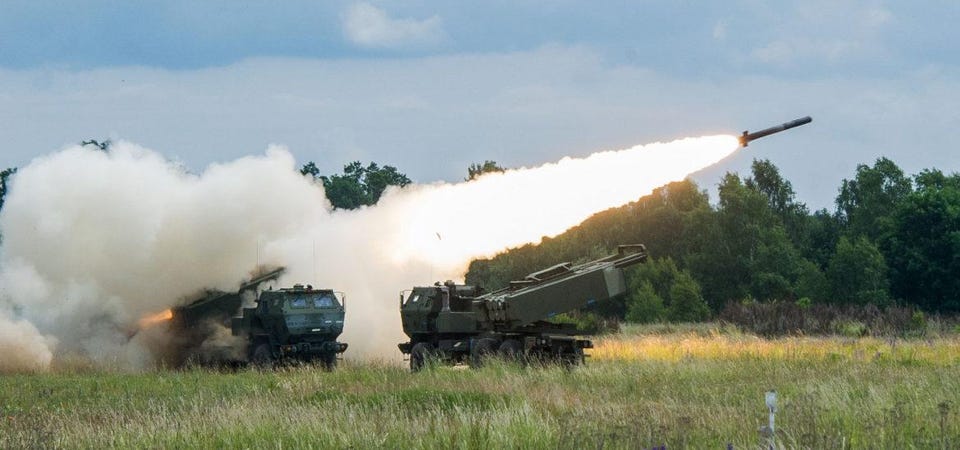
Photo credit: Markus Rauchenberger
Alongside their stepped up military intervention, the Western imperialists have greatly ramped up their economic sanctions on Russia. They have also dialed up the intensity of their propaganda war. Initially the tycoon-owned and government-run media outlets in the U.S., Europe and Australia, as part of their anti-Russia war propaganda, claimed that Russia was killing many civilians by accident in the course of air and artillery strikes on military targets. Later, the Western media started lying through their teeth by claiming that Russia was deliberately bombing residential areas, schools and hospitals. Then they escalated their propaganda still further by working with the Ukrainian regime and Western “NGOs”, intelligence agencies and public relations consultants to claim that Russian troops had senselessly massacred a large number of Ukrainian civilians while withdrawing from towns north of Kiev, like Bucha. Given that the Russian withdrawal from this region was planned and announced days beforehand as part of her military’s overall strategic plan, the Western media’s claims are extremely hard to believe. Why would Russian troops making an orderly withdrawal, in which they were able to take all their working heavy weapons with them, choose to leave behind supposedly indiscriminately slaughtered civilians on the side of the road in the perfect position to be used as propaganda against them?
When it comes to lying propaganda, the most rabid outlets have been the BBC, the Australia regime’s ABC and the German government’s Deutsche Welle – the latter spewing out propaganda with all the zeal and dishonesty of their political forebears in Joseph Goebbels’ Nazi propaganda machine. In the first few weeks after Russia began its operation on February 24, these news outlets, while bombarding their populations with blanket anti-Russia propaganda, on rare occasions did made oblique references as to why many Russian speaking people in Ukraine’s eastern Donbass region were welcoming of the Russian intervention. On still rarer occasions they did mention the fact that many Russia-speaking people had been killed during the course of an eight year regional conflict that preceded the Russian intervention. A very small number of outlets briefly also reported, while downplaying the significance of these crimes, that Ukrainian soldiers had been abusing and torturing Russian prisoners of war. Yet in the weeks since, even the smallest pretense of balanced reporting has disappeared entirely from the Western media. Any, even limp, criticism of the Ukrainian regime and its military has been completely purged from all reports. The fact that Ukrainian troops and fascist paramilitaries have been shelling residential areas in Donbass cities held by pro-Russian forces has been completely whitewashed. So has the overwhelming evidence that Ukrainian forces have been using civilians as human shields by hiding in residential areas, schools and hospitals; and by preventing civilians from leaving the underground bunkers where Ukrainian forces established bases in their now defeated strongholds of Mariupol and Severodonetsk.
The intensifying character of the Western imperialists’ intervention into Ukraine can be gleaned by examining their media’s coverage of Ukraine’s fascist paramilitary forces. After Ukraine had a U.S.-backed right-wing coup in 2014 and war erupted in the eastern part of the country, the Western mainstream media did their best to downplay the spearhead role played by fascist forces in both the coup and the ensuing war. Nevertheless, there were occasional reports in the Western media highlighting the extreme white supremacist and anti-Semitic character of Ukraine’s Azov paramilitaries and the surge in racist violent attacks by such forces against Ukraine’s Roma community, pro-Russia activists and feminists. However, after Russia’s February 24 intervention such reports largely vanished. The executions of pro-Russia civilians by the likes of the Azov regiment was simply not reported by the Western media. Instead of the Azov being described as what they are – neo-Nazi fascists – the Western media used the less damning and vaguer term, “far right.” Then, as the U.S. and its allies stepped up their support for Ukraine by several gears, even that latter description was dropped. The likes of the BBC even started claiming that statements about the racist and neo-Nazi character of the Azov “have been widely discredited” … even though outlets such as their own did at one time occasionally make such “discredited” reports themselves! Most recently, when large numbers of the Mariupol-based Azov soldiers were trapped (along with an apparently smaller number of regular Ukrainian troops) in underground bunkers in a Mariupol steel works, the supposedly “democratic” Western media started positively lionizing the Azov white supremacists as heroes!
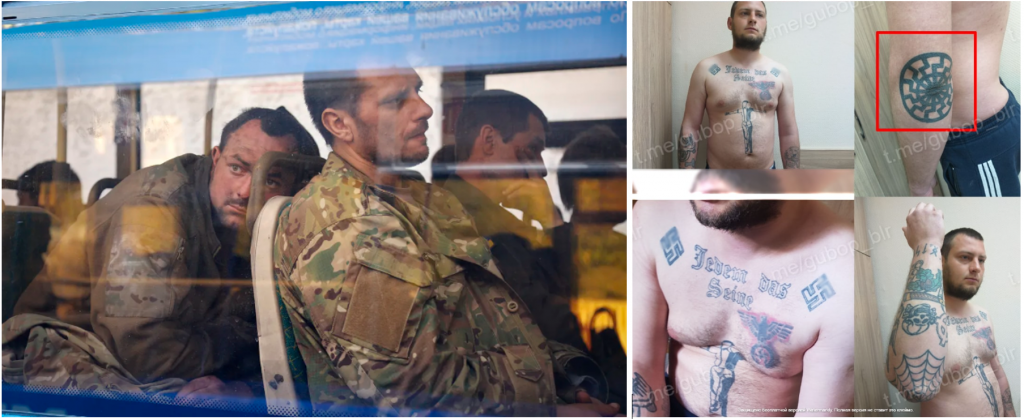
Photo credit for photo on Left: Alexei Alexandrov/The Associated Press
The Changed Character of This Conflict
In summary, since late March, America’s rulers and their allies have greatly ramped up their military, economic and political support to Ukraine in its war against Russia. We can now clearly say that this Ukraine-Russia war has effectively become an indirect war of the U.S. rulers and their NATO, Australian, Japanese and New Zealand imperialist allies against Russia, with Ukraine acting as the proxy. The same Western capitalist ruling classes waging a proxy war against Russia are the biggest bullies and oppressors of the world’s peoples. It is they who destroyed Iraq, Afghanistan and Libya, devastated Syria through a years-long proxy war, killed thousands of civilians in their 1999 bombing of Yugoslavia, occupied and terrorised the people of Somalia and in the specific case of Australia’s rulers, caused the death of up to 20,000 people after they orchestrated a decade-long war and blockade of the South Pacific island of Bougainville in the late 20th century after the people there rose up against the arrogant trampling of their rights by an Australian-owned mining company. Therefore, it is in the interests of the working class of the world and all the people subjugated by imperialism to see the Western imperialists and their Ukrainian proxies defeated in this war. Such a defeat would weaken the ability of the imperialists to mobilise further predatory interventions abroad. It would also deter their plans to use Taiwan as a proxy to pressure socialistic China or even to incite a world war against the socialistic giant. Moreover, any setback for the U.S. imperialists and their allies in this proxy war would give encouragement to the resistance struggles of all those being subjugated by the U.S. and its allies elsewhere, like the Palestinian people suffering under incessant Israeli terror. More generally, a defeat for the Western powers in their Ukraine proxy war could only encourage the toiling masses of Africa, Latin America, the South Pacific and most of Asia to resist in their own lands the various Western capitalists that super-exploit labour, plunder natural resources, leach loan interest repayments, seize markets and manipulate and stand over governments. Within the Western countries themselves, a defeat for the capitalist ruling classes in their proxy war would weaken their authority. It would thus open opportunities for the working class and oppressed to wage mass resistance against soaring rents and food and fuel prices, plummeting real wages, the incessant expansion of insecure work forms and brutal racist oppression of persecuted communities. Therefore, the workers movement in Australia and other imperialist countries must stop the military aid to Ukraine and demand the lifting of all sanctions against Russia!
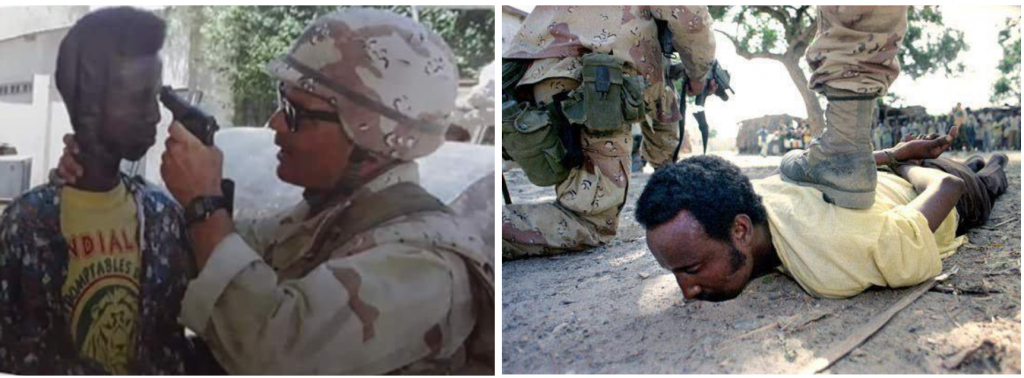
To be sure, Russia is also ruled by a greedy capitalist class. Moreover, economic realities drive this class to seek to be an imperialist ruling class – that is a capitalist class that not only extracts profits from exploiting workers in their own country but which also reaps substantial wealth through the super-exploitation and economic domination of poorer countries. Yet, although being the world’s number two military power and with a strong industrial and technological base inherited from the days of the USSR, currently the Russian ruling class neither fully has the level of capital needed to displace the current imperialist players as the main subjugators of “Third World” economies nor the close relationship with an existing imperialist player that would allow them to prise their way into the imperialist big league without the possession of such a huge level of capital. That is why, although Russia’s capitalist ruling class has, to a limited extent, aspects of an imperialist country-dependent country relationship with certain neighbouring ex-Soviet countries, it is overwhelmingly not Russian capitalists but American, British, German, Japanese, Australian, French, Canadian and other Western bankers, mining bosses and owners of industrial and agricultural corporations that plunder and leach from the poorer countries of developing Asia, the South Pacific, Africa, the Middle East and Latin America (note that although mutually antagonistic, Russia’s relationship with Ukraine prior to the current war was not an imperialist country-dependent country one and, just like Russia, Ukraine also inherited a good chunk of the industrial, technological and military might of the former Soviet Union and the highly educated, technically literate population nurtured in the Soviet Union). And it is the Western states enforcing the interests of its capitalists, rather than the Russian state, that have been muscling in on the state affairs of dependent and neo-colonial countries, orchestrating “color revolutions” to overthrow disobedient governments there and threatening dissident countries with outright invasion. Let us not lose sight of the fact that it is the U.S and its allies and not Putin’s Russia that invaded and devastated Iraq, Somalia, Afghanistan and Libya and which is propping up Israel’s bloody war on the Palestinian people and Saudi Arabia’s war on the people of Yemen. All this is why, as reactionary as Russia’s capitalist rulers are, a victory for Russia against the Western ruling classes and the latter’s Ukrainian proxy will encourage anti-imperialist struggles by the masses in the “Third World” countries, alongside spurring class struggle by the working class within the West against their own capitalist rulers. Whereas Russia’s defeat at the hands of the Western powers and their Ukrainian proxy will embolden the Western imperialists to further subjugate the peoples of developing Asia, the South Pacific, Africa, the Middle East and Latin America and to, at home, more aggressively attack workers’ real wages and the rights of persecuted minority communities.
For socialists based in Western countries, the changed character of the Ukraine-Russia war does not substantially affect our main tasks. From the very start of the Russian intervention, the response of leftists in the West needed to be guided by the understanding that it is the Western imperialist rulers and not Putin’s ambitious capitalist regime who are the main tyrants lording it over the world’s peoples. Moreover, based on the Leninist principle that the main enemy of the working class in an imperialist country are their own capitalist rulers, socialists in Australia would have to focus on opposing the intervention of the Australian ruling class into this war and on opposing first and foremost the side in this war that these imperialist rulers’ are supporting, which is Ukraine. Sticking by these principles, Trotskyist Platform statements written early on in the war had as their main headline: “Oppose Western Imperialism’s Provocative and Hypocritical Interference in Ukraine and Oppose Sanctions Against Russia! No to NATO Expansion! No U.S./Australian arms to Ukraine!” These remain the punchlines of the stance that needs to be taken by the Left and workers movement in Australia.
Where the changed character of the conflict does make a clear practical difference is in the work required of leftists in Russia. In our statement written in the early days of the conflict, we called for the working classes of Ukraine and Russia to unite to oppose the war campaign of each of their respective rulers, while simultaneously insisting that communists in Russia should be intransigently opposed to any pro-NATO or other pro-Western “anti-war” groupings and should keep any of their anti-war actions strictly separate from such forces. Today, in the wake of the changed character of the war, we of course still say that the workers of Ukraine should struggle against the war campaign of their own capitalist rulers. However, given that this war has become a proxy war of the united imperialist powers to bring to heel a mostly non-imperialist power in Russia, a war in which the working class of the world has a side against the imperialists, then we say that the Russian working class should no longer oppose the war campaign of their own ruling class. They should of course continue the class struggle and advance towards the future overthrow of the Russian capitalist exploiting class, which remains no less their enemy, but they should ensure that any such struggle does not disrupt the war effort against the U.S.-led imperialists and their Ukrainian proxies.
Although the changed nature of the war means that Russian leftists should no longer oppose Russia’s war campaign, we say that they should not positively support it either. For Russian leftists to actively support the war campaign of their own rulers – for example by participating in pro-Russian Army rallies – would associate the Left with Russian nationalism and patriotism. Although patriotic sentiments in Russia in part arise from the unfair treatment of Russia by Western imperial powers and from the masses’ resentment at the devastation and diminished status that Russia was pushed into following the Western-orchestrated destruction of the Soviet Union, Russian patriotism damages working-class struggle. For it ties workers to their ambitious capitalist exploiters on the basis of a non-existent “common national interest.” Such Russian patriotism is therefore overall reactionary, which is why Russian revolutionary leader Lenin fought tooth and nail against it in the years leading up to the 1917 October socialist revolution. Lenin’s anti-patriotic stance remains valid today because although Russia is not a full-fledged imperialist power as it was in pre-Soviet times, it is also not simply a semi-colonial or dependent country subjugated by imperialism as say Iraq, Syria, Libya and Somalia were (and still are today). Therefore a victory for Russia in this war would have a very different effect on Russia’s working class than the impact on, say, the Iraqi toiling masses had they been able to resoundingly defeat the 2003 U.S., British and Australian invasion. Such an outcome in the Iraq War would have generated a resounding sentiment among the Iraqi toilers that: “we have just beaten off a direct invasion from the imperialist overlords, it is time for us to finish off the local capitalist ruling class that are so dependent on and economically tied to these imperialists.” In contrast, a Russian victory in this current war would give the Russian capitalist ruling class renewed authority, while reinforcing Great Russian chauvinism and all manner of social reaction. This has already been evident in the last few weeks coinciding with increasing Russian battlefield victories. Some nationalist Russian celebrities like famous actress and media personality, Maria Shukshina, have felt emboldened to denounce Russia’s national minorities. Meanwhile, earlier this month, Russian politicians introduced a homophobic bill to parliament that will unleash draconian fines for people “promoting non-traditional sexual relations” (a bill that spits on the traditions of Russia’s 1917 Bolshevik Revolution that had made Russia the first large country in the world to decriminalise all gay and lesbian sexual activity).
Therefore, while Russian communists should not oppose Russia’s war efforts they must oppose any Great Russian chauvinism and social reaction inflamed by Russia’s battlefield successes. They must also insist that in Donbass territories conquered by Russian troops and their local Donetsk and Luhansk republic allies, the terms of oppression are not simply reversed. In other words where it was formerly Russian speakers who were oppressed, Ukrainian speakers should not now be discriminated against. That means that Russian communists should insist on Ukrainian becoming a joint official language in all the Russian-controlled Donbass territories and that those people who choose to live in the Russian-controlled territories for political or economic reasons but who wish to retain their links to Ukrainian language and culture are fully able to do so. Moreover, Russian leftists should stand for the expulsion of all Russian fascists from the Donbass. Although the component of fascists within the pro-Russia Donetsk and Luhansk forces is far less than in the Ukrainian forces, Russian fascists like the Russian National Unity group have had a presence. Authentic Russian communists should also oppose any internal party witch-hunts and state repression against several parliamentarians from the Communist Party of the Russian Federation (CPRF) who have defied their party’s line and opposed Russia’s war campaign. Russian leftists should salute the internationalist instincts of these dissenting CPRF members and their courage in opposing their own capitalist ruling class, while patiently explaining to these comrades why their stance is mistaken given that this has become an imperialist proxy war against, largely, non-imperialist Russia.
At the same Russian communists should oppose and mercilessly condemn any pro-NATO/pro-Western opponents of the war campaign – like supporters of jailed opposition politician Alexei Navalny. For while a Russian military victory would inflame social reaction within Russia, a victory for NATO’s Ukrainian proxies would also be harmful to the class struggle in Russia. Such an outcome would demoralise the masses, greatly embolden the pro-imperialist wing of the Russian capitalist ruling class and may well lead to the Russian working class not only having to face their own local exploiting class but Western imperialists again able to place their dirty paws upon Russia (as they did in the first decade and a half after the early 1990s capitalist counterrevolution that destroyed socialistic rule in Russia, Ukraine and the other parts of the former USSR). The reality is that while a victory for Russia in this war would be in the interests of the working class and oppressed in all of the rest of the world, any outcome to this war will be harmful to the working class movement in Russia – other than if victory for Russia is partly or mostly achieved as a result of the anti-imperialist mobilisation of the working class in the imperialist centres and/or significant resistance by a section of the Ukrainian masses against their own capitalist rulers and its war campaign. Hence our position that while in the rest of the world the workers movement should energetically work for the defeat of the Western imperialists and their Ukrainian proxy, within Russia the working class should continue the class struggle and the building of a revolutionary socialist movement without either impeding or supporting Moscow’s war effort. The best way for workers and leftists in Australia to assist the class-struggle of the Russian working class and to promote internationalist sentiments amongst the Russian masses is to mobilise against the proxy war that our “own” rulers are waging against Russia.
We are well aware that the stance that we advocate for Russian communists does not fit neatly into either the position of revolutionary defensism that Leninists advocate for semi-colonial and other dependent countries in wars with imperialist power/s or the stance of revolutionary defeatism that Leninists call for, either in a clash between rival imperialist powers or in a war between non-imperialist states of a similar level of development. Our position however flows from the unique nature and history of today’s Russia. Prior to the 1917 Russian Revolution, capitalist Russia was an imperialist “great power” but the most economically backward of the imperialist powers. She was able to grab a share of the bounty of imperialist exploitation largely by acting as the enforcers in the East of the capital investments of wealthier imperialist powers like Britain and France. After the 1917 socialist revolution, Russia not only ceased to be ruled by capitalists but she, therefore, also ceased to be an imperialist exploiter. Indeed just like today’s Red China, the socialistic USSR that Soviet Russia was part of provided great economic and development assistance to ex-colonial countries – in Africa, Latin America, the Middle East and South Asia in particular – that allowed them to achieve a certain independence from Western imperialism that they would not have otherwise had. The advantages of the USSR’s socialist system meant that Russia, as part of the USSR, not only rose to become the world’s equal first military power but also became an industrial and scientific powerhouse much closer to the level of the most advanced countries than Russia had been in pre-1917 times. Therefore, when capitalist rule was re-established in Russia in the early 1990s, theoretically the new Russian capitalist class was in a position to play a relatively bigger role in imperialist looting than their pre-1917 forebears were able to do. However, the capitalist counterrevolution led to a shocking economic decline in Russia and the stunning weakening of her Soviet-inherited industrial base. This only started to be turned around in the twenty-first century after a sharp rise in oil prices greatly boosted the export income of energy-rich Russia and after the Russian capitalist ruling class got their act together somewhat and reduced their previously rampant level of personal mafia-like criminality for the sake of the overall interests of their class. However, Russia’s post-Soviet capitalist rulers face a still greater obstacle to their wish to re-build a version of the Tsarist empire. For the domination of most of the world has already been divided up amongst pre-existing imperial powers. Facing this situation, the new Russian capitalist class does not quite possess the capital required to shove aside existing players and muscle themselves into an imperialist position. Moreover, none of the existing imperialist powers has been willing to partner with Russia. With senile capitalism in economic decline, none of these imperialists is willing or able to afford to share a significant part of the imperialist loot with Russia should they agree to partner with her. Thus, the Russian capitalist class’ other route to sharing in imperialist plunder is, for the moment, also blocked. We are left with a country that matches the U.S. in nuclear weapons strength, which possesses considerable remnants of the industrial and technological strength inherited from Soviet times and that has a per capita income (in PPP terms) within 20% of that of imperialist Portugal but which is still not currently a full fledged imperialist power and yet clearly cannot be considered an imperialist-dependent or subjugated country either.
It should be noted that, in some sense, our exposition of the tasks of leftists in Russia is somewhat academic. We have no base there and little ability to influence the politics of communists in that country. However, stating the line that we believe should be taken by Russian socialists in the wake of the changed character of this current war does, in passing, help to make clearer the stance that must be taken by leftists in Australia. In particular it helps to underscore how urgent it is that socialists in Australia and other imperialist countries mobilise to oppose their regimes’ massive war assistance to Ukraine.
What is Driving the Western Imperialists to Wage a Proxy War on Russia?
To some degree, this war has been an anti-Russia proxy war of Washington and its allies from the beginning. The U.S. and NATO provoked this war by threateningly expanding NATO eastwards towards Russia and by encouraging Ukraine’s course towards joining NATO. Then, when in the days leading up to the Russian intervention, Ukrainian president Zelensky seemed to be open to a compromise deal with Moscow facilitated by French and German diplomatic efforts, Washington and Ukraine’s influential fascist groups pressured Zelensky to walk away from the deal. The U.S. ruling class did much to provoke the Russian intervention. Indeed, part of Russia’s reason for invading Ukraine was a quite understandable wish to pre-emptively prevent NATO forces and NATO missiles being placed on her borders.
However, there were initially other more significant reasons for Russia’s February 24 intervention. For one, Russia’s rulers had faced considerable public pressure to come to the aid of the Russian-speaking population in Ukraine’s eastern Donbass region who had been brutally oppressed by Ukraine’s military and even more cruelly by its ultra-nationalist paramilitary forces. A large chunk of the Russian-speaking population in this region had rebelled against the Kiev regime ever since anti-Russia, Ukrainian nationalist forces seized power in Kiev in a 2014 right-wing coup. However, in coming to the aid of the Russian-speaking Donbass rebels, Moscow has not merely been responding to public pressure and not simply acting out of nationalist concern for fellow Russian speakers. By either bringing the Donbass into Russia or making it an independent country close to Russia, Russia’s capitalist rulers want to secure markets and raw materials in this heavily industrialised region after having been squeezed out of access to the broader Ukrainian market following Ukraine’s pro-Western 2014 coup. Moreover, in pushing into territory in Ukraine beyond that where the mass of the population overwhelmingly wants to be part of, or associated with, Russia, Moscow is pursuing the innate capitalist drive to maximise the size of secure markets by maximising territory. Similarly, by insisting on forcibly maintaining the entire Donbass within its territory when much of the Russian-speaking population in at least large parts of this region would prefer to be part of, or associated with, Russia, the Ukrainian regime is also driven by the capitalist imperative to maximise territories. The faltering of their respective capitalist economies made this capitalist squabble for territory between Russia and Ukraine all the more desperate on both sides. Both Russia and Ukraine were beset by rampant inflation even prior to the outbreak of this war while Ukraine’s economy was actually contracting in per capita terms. Moreover, by ramping up nationalism during their respective war drives, the capitalist ruling classes in both Ukraine and Russia could divert the anger of the working class masses away from themselves. And the masses in both countries had much to be furious about. In both countries, the inability of their capitalist systems to protect their populations from COVID led to a terrible carnage many times greater than the numbers of people who have thus far died from this current war – with over 105,000 deaths in Ukraine by the start of the war and nearly 350,000 in Russia. In Ukraine, there had been such anger at persistently high unemployment, falling living standards and rampant corruption that by January last year, the opposition party advocating closer ties with Russia was leading in opinion polls in even the non-rebel held parts of the country. Meanwhile, in Russia, the capitalist regime had been on the receiving end of the people’s ongoing anger over massive inequality and over a 2019 pension reform that greatly increased the age at which Russian people can receive pensions. All these factors driving the initially squalid inter-capitalist war between Ukraine and Russia remain today. But they have now been overshadowed by the now dominant axis of the conflict – a proxy war of the Western imperialist powers aimed at bringing to heel its Russian, potential capitalist rival. What had been an important subsidiary aspect of the conflict has become the main feature of the war. Indeed in late April, U.S. Secretary of Defense Lloyd Austin made clear that Washington’s involvement in this war was not even mainly about the Ukraine issue itself. Austin told reporters that, “we want to see Russia weakened.”
So why do the Western imperialists want to weaken Russia? The answer to this question has nothing to do with the two main rationales given by Washington, Canberra and Co. for their heavy-handed intervention into this conflict. One of these rationales is that they are seeking to protect the people of Ukraine. Yet everything that the Western capitalist ruling classes have done over the past decades has shown how little they care for the well-being of the Ukrainian masses. It was these imperialists that orchestrated the early 1990s capitalist counterrevolution there. It was that counterrevolution that directly led to the mass privatisation that devastated the living standards of Ukraine’s working class people, weakened the technological and industrial base of the country (that when part of the socialistic USSR was at such a high level that she was able to play a key role in building the world’s largest aircraft – the magnificent Antonov An-225) and paved the way for the terrifying growth of violent fascist groups. Then in 2014, the U.S., British and EU ruling classes promoted a right-wing coup that overthrew Ukraine’s elected government and brought right-wing extremists into key parts of Ukraine’s state machinery. Now the imperialists are fighting a proxy war to the last drop of Ukrainian blood in order to reinforce their tyranny over the world.
The second rationale given by the imperialists for their proxy war against Russia is the claim that they are standing up for “democracy” against “authoritarianism”. This is laughable given that the U.S., European and Australian governments have been busy censoring any voices questioning their narrative on this war, including by outright banning Russian media outlets from broadcasting in their countries. Meanwhile just yesterday, the courts of the U.S. regime – the supposed standard bearer of “liberal democracy” – made a ruling that will see women in almost half of America’s states lose one of the most basic human rights – the right to abortion. Now that is authoritarian!
As for the Ukrainian regime that is being supported by the Western imperialists, it is very far from being a bastion of “democracy” – even in the sense of being a capitalist “democracy” where certain freedoms associated with elected parliaments are mixed in with total domination of the state and politics by the wealthy capitalists. Let’s not forget that in the eight years preceding this war, the Ukrainian regime had brutally killed thousands of Russian speaking people by indiscriminately shelling territories in the country’s eastern Donbass region that were held by pro-Russia rebels. Now, they have banned nearly a dozen centrist and leftist parties including the country’s biggest opposition party: the Opposition Platform — For Life. Even in the years preceding this war, Ukrainian authorities jailed large numbers of pro-Russia and leftist opposition activists. Meanwhile, extreme Ukrainian nationalists murdered journalists, social activists and those with pro-Russia sentiments, with the perpetrators rarely identified, let alone punished. Thoroughly corrupt and dominated by powerful oligarchs, the Ukrainian capitalist order is in many ways similar to Russia’s. But it is even more repressive. For example, while demonstrations by staunch pro-communist groups have often been attacked by police in Russia, in Ukraine, absolutely all activity by the large Communist Party of Ukraine – including its participation in elections – and other pro-communist groups has been prohibited for the last several years. Meanwhile, the Ukrainian regime has introduced draconian laws that can see anyone who displays a communist or Soviet flag or sings communist or Soviet anthems jailed for five years. Moreover, while Russian government politicians have often allied with far-right politicians, in the Ukraine fascists have actually been brought into key positions in the country’s state machinery, while large neo-Nazi paramilitary groups like the Azov and Aidar battalions have been officially incorporated into Ukraine’s National Guard. The racist nature of the Ukrainian state has indeed been very evident during this war. Ukrainian border guards have racially abused dark-skinned international students (from places like Nigeria, Zimbabwe and India) fleeing the war and forced international students approaching the border to alight from vehicles and walk huge distances in freezing weather to get to the border so that Ukrainians could use their vehicles instead.
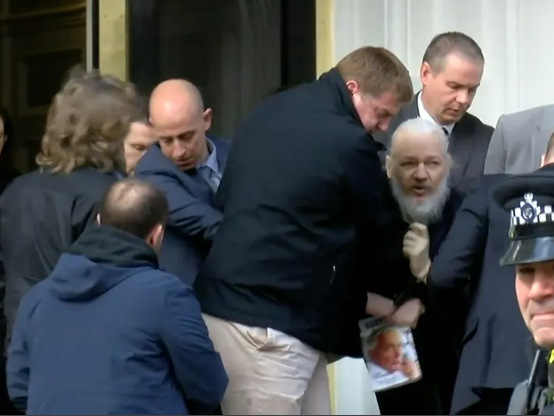
So what are the real reasons for Washington and its allies’ proxy war against Russia? For one they want to maintain their prized access to the Ukrainian market. Before 2014, Russia was the main source of Ukraine’s imports. However, after Washington and the EU powers orchestrated the 2014 anti-Russia, right-wing coup in Kiev, much of Russia’s exports to Ukraine were replaced by ones from Germany, the U.S., Poland, Italy and France. Today, the capitalist rulers of these latter countries want to maintain this post-2014 status quo. They know that a sizable chunk of this market would be lost should the rich Donbass region and Ukraine’s south end up acceding to Russia or becoming pro-Moscow independent states. However as significant as this reason is – especially to EU governments – it is not the main factor driving Western ruling classes to wage a proxy war against Russia. Mainly, Washington and its allies want to prevent Russia emerging as an imperialist competitor and instead seek to reduce her to a subordinate position. Especially with their own economies faltering, the existing imperial powers cannot afford to have a new imperialist player intruding on their neocolonial exploitation of Latin America, Africa, South Asia, Southeast Asia, West Asia and the Pacific. Moreover, not only are the existing imperialists unwilling to accept a new imperialist rival they cannot even tolerate a non-imperialist state being strong enough to obstruct their ambitions. Thus, the Western imperialists hope to not only suppress Russia’s great power aspirations but seek to weaken her through a combination of military blows from their Ukrainian proxies and grinding economic sanctions. To be sure, they know that given that Russia is a formidable military and technological power, they will not be able to lord it over Russia in the same neocolonial manner that, say, Australian imperialism subjugates Papua New Guinea or the U.S. ruling class exploits the Philippines. However, by weakening Russia, the Western imperialists hope to reduce her to the humiliated condition that she was in during the first fifteen years or so after the 1991-92 capitalist counterrevolution there. During those years, the U.S. and European powers were able to dictate economic policy to Russia while grabbing prized access to her markets and ownership of chunks of Russia’s industrial and mining sectors as well. Just as importantly for the Western ruling classes, a debilitated Russia would be easier for them to elbow out of the way when seeking to grab markets and trade opportunities in the ex-Soviet countries of Central Asia and the South Caucasus.
Defend Socialistic China!
It is important to be aware that the imperialist proxy war against Russia is not only about Russia itself. Following their humiliating defeat in Afghanistan, the U.S. and Australian ruling classes, in particular, hope that what they intend to be a successful proxy war against Russia will restore – both in the eyes of their own populations and in the sentiments of other countries – credibility to their practice of throwing their military weight around. Most importantly for the Western ruling classes, this proxy war is meant to be an indirect slap against their main strategic target: the Peoples Republic of China (PRC). The Western capitalist powers see China as the main threat to their domination of the world because, unlike Russia which is just another capitalist country, albeit one that is currently obstructive to their interests, China is a socialistic country. Even though China’s march towards socialism remains incomplete, prone to veer of course and relentlessly pelted by internal and external capitalist enemies, the imperialist ruling classes of the U.S., Britain, Germany, Australia, Japan and other Western ruling classes understand that the mere existence of such a giant and evermore successful socialistic power is an existential threat to their imperialist interests. For not only is the non-imperialist PRC’s cooperation with developing countries allowing some of these countries to, right now, uplift themselves to the extent that they can somewhat loosen the stranglehold of Western imperialism over their countries, in the longer term, China’s ever-expanding achievements made possible by her 1949 anti-capitalist revolution could encourage the masses of other ex-colonial countries to also take the path of socialist revolution to decisively free themselves from Western domination. Even more threateningly for the Western exploiting classes, as China’s per capita income heads towards approaching closer to that of their own countries in future years, the working class masses in their own countries could start to look more favourably upon the PRC and, eventually, even start demanding socialism at home too.
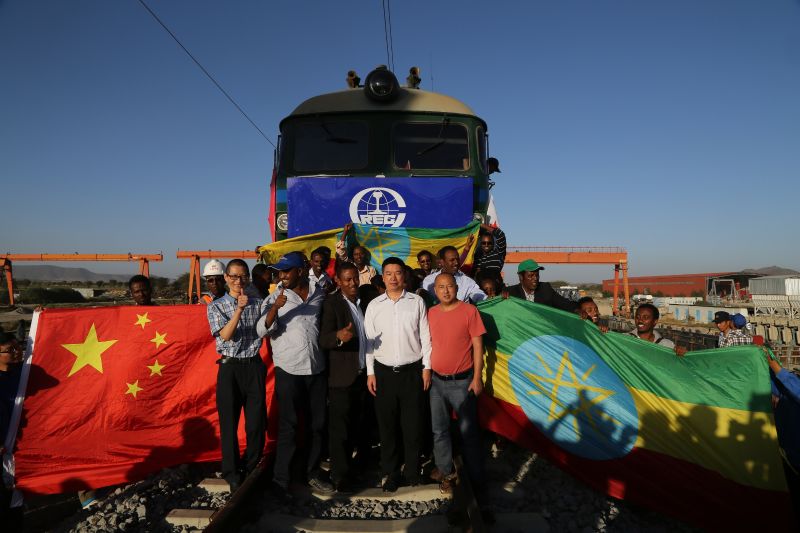
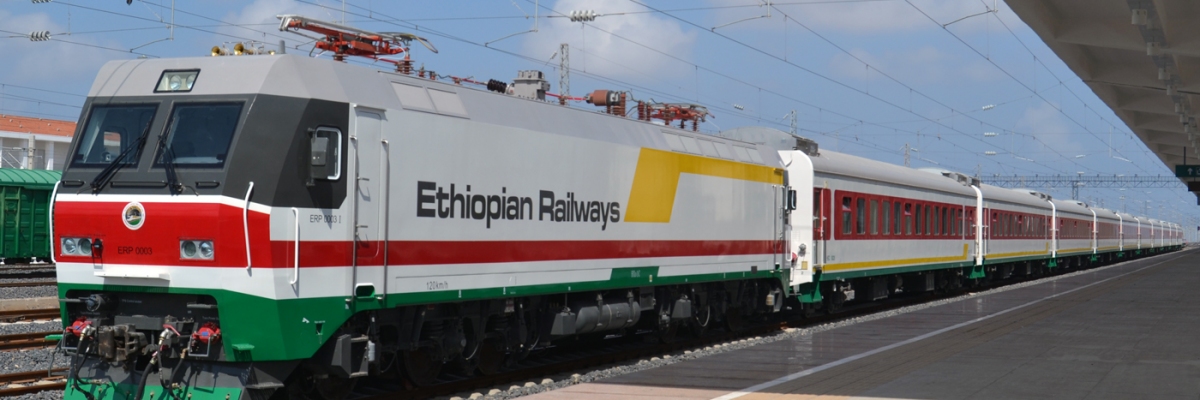
Photo credit (top photo): China Railway Group Limited
Photo credit: (above photo): 2merkato.com website
Photo credit (below photo): Xinhua Silk Information Service
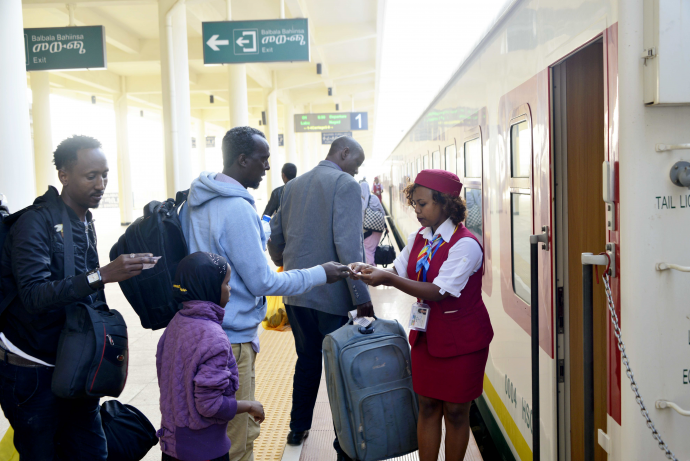
So how does waging a proxy war against Russia advance the imperialist drive against Red China? For starters, aware that the hostility that they have unleashed – for very different reasons – against China and Russia has pushed these two non-Western powers closer together, the Western imperialists hope that their massive propaganda war launched against Russia following Putin’s Ukraine invasion will, by association, also tarnish the PRC. In this way they intend to intensify political pressure against socialistic China. Indeed, the imperialists’ increased political attacks on the PRC over the last four months have actually produced some tangible results for them. It seems to have encouraged softer-on-imperialism, more rightist factions of China’s ruling Communist Party (centred on the party’s number two ranked figure, premier Li Keqiang, and number four ranked politician, Wang Yang) to gain greater influence. In recent months they have been able to reduce the momentum of president Xi Jinping’s crackdown on greedy rich, tech-sector capitalists and slow his “common prosperity” drive to reduce inequality.
Secondly, the U.S. and its allies intend their military support to Ukraine and economic sanctions against Russia to enfeeble Russia to the point that, at minimum, she will not be able to obstruct any U.S./NATO/Australian military provocations against China. In their best case scenario, they hope that they can cause such military losses for Russia in Ukraine and such economic pain for her people that it will trigger a “colour revolution” there that will replace the Russian nationalist Putin regime with a regime subservient to Washington and its allies – that is, a pro-Western regime that may even enlist Russia in the imperialists’ Cold War drive to crush socialistic rule in China. Thirdly, in waging their increasingly all-out proxy war against Russia, the Western imperialists are trialing and perfecting the methods that they seek to one day unleash against Red China, using Taiwan or other capitalist regimes neighbouring China as their proxies.
For the very same reasons that it is in the interests of the Western capitalist exploiters to oppose the Chinese workers state it is in the interests of the working class masses in their own countries – and indeed of the entire world – to defend the PRC. The indirect weakening of imperialism’s grip over its former colonies resulting from China’s rise is not only welcome news for the peoples of the Pacific, Africa, Latin America and developing Asia it is also good for the working class people living in the imperialist centres. A reduction in the ability of Western multinational corporations to plunder “Third World” countries makes it easier for workers and unions in the West to stand up to these companies and resist their incessant drive to lower workers’ real wages. Moreover, the fact that the world’s most populous country continues to cling onto a socialistic path can only give the toiling classes in the capitalist world hope that it is indeed possible to advance toward socialism – that is, advance towards a system that will finally liberate the masses from surging rents and grocery prices, ever greater exploitation of labour by capitalist business owners, insecure forms of work, racist discrimination of First Peoples and ethnic minorities, oppression of women and imperialist war. That is why we in Trotskyist Platform completely oppose the U.S., NATO and Australian military escalation against China. We say: U.S., Australian and British warships, get out of the South China Sea! U.S. troops out of Darwin! Down with ANZUS! Down with AUKUS! Not one submarine of any type, not one missile, not one warplane, not one person for Australia’s capitalist-serving military! Australian capitalist rulers: stop your neo-colonial bullying of Pacific countries that choose to establish cooperation with the PRC!
It is not enough to oppose the direct military threats to the PRC. The Australian ruling class’ military pressure against the PRC is part of an all-sided anti-communist Cold War. This includes a relentless anti-PRC propaganda campaign, support for Chinese anti-communist groups seeking the destruction of socialistic rule and McCarthyist intimidation of Chinese international students and migrants (and even some mainstream politicians like NSW upper house Labor MP, Shaoquett Moselmane) who dare to express even the slightest sympathy for the PRC. Unfortunately, most of the other left-wing groups in Australia, such as the Solidarity group, while stating opposition to the military buildup against China, actually join in the lying attacks on China over “human rights” and actively support the very same anti-communist forces within China that are backed by Australia’s capitalist rulers and their media. In doing so the likes of Solidarity are reinforcing the propaganda used by Australia’s exploiting class to “justify” their military build-up against socialistic China. In 2019, Solidarity as well as Socialist Alternative and Socialist Alliance – and to a slightly lesser extent the Socialist Equality Party – rubbed soldiers with right-wing, rabid anticommunists, both of local origin and those from Hong Kong, China and Vietnam (and even some Australian white supremacist activists), in participating in a series of anti-PRC demonstrations in support of violent anti-communist riots in Hong Kong. In supporting this movement, these groups poisoned the image of the PRC in the eyes of those that they influence, which is progressive layers of society – that is precisely the section of the community that could most easily be won to opposing the Cold War drive against Red China. In doing so, these wavering socialist groups have made it much harder to build opposition to the military escalation against China and to AUKUS, which they today proclaim their intention to campaign against. At the very least they are supporting the capitalist powers’ drive to crush socialistic rule in China by non-military means – that is via Western-backed anti-communist forces within China. Let’s remember, in the final instance, socialistic rule in the former USSR was not destroyed by military attack but by internal capitalist restorationist forces backed by Western imperialism. Infuriatingly, the very same left groups that in the previous Cold War backed these counterrevolutionary forces that destroyed the gains of Russia’s 1917 socialist revolution – under their previous names Solidarity, Socialist Alternative (these two groups were the components that came from the then ISO) and Socialist Alliance (then called the DSP) supported the Washington-backed pro-capitalist movement led by Boris Yeltsin that seized power in Moscow in August 1991 – are today supporting the modern-day Chinese equivalents of these capitalist counterrevolutionary forces!
In contrast to those leftists who are being swept away with the tide of Cold War propaganda, Trotskyist Platform has been energetically campaigning – including by holding street protests – against the entire military, political and propaganda drive of the U.S. and Australian capitalist rulers against the Chinese workers state. We call on authentic leftists to join with us in saying: Down with the lying accusations that China is “violating” the human rights of Uyghurs and Tibetans! Oppose the pro-colonial, rich people’s anti-PRC movement in Hong Kong! No support to capitalist Taiwan – reunify China through spreading China’s 1949 socialist revolution to Taiwan! Down with the Greens, Liberals and ALP’s McCarthyist campaign to shutdown the PRC-linked Confucius Institute Chinese language schools!
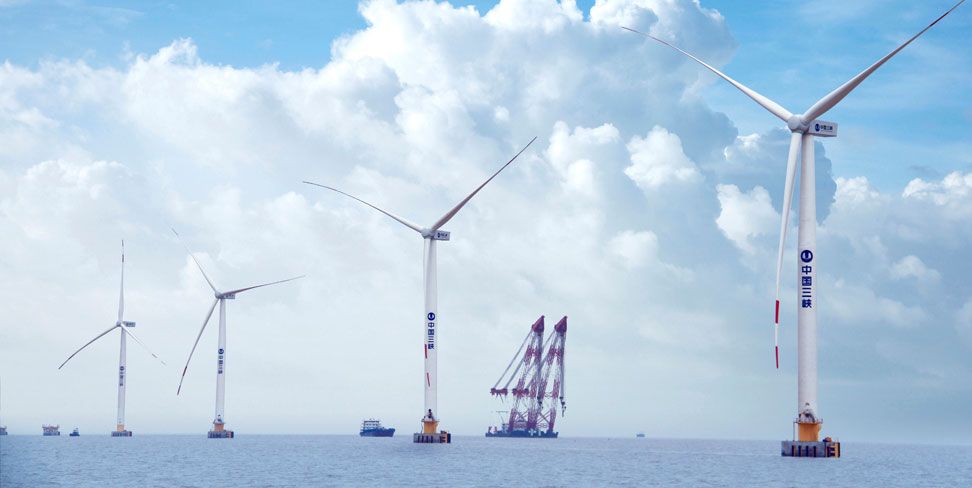
China’s Jiangsu Xiangshui offshore wind farm built by her state-owned power giant, Three Gorges. China’s socialistic state-owned firms, in which the profit motive comes second to serving people’s needs, have spearheaded China’s transition towards renewable energy. China’s public sector enterprises along with working class state power are the bedrock of her socialistic system. However, a sizable capitalist sector remains there deforming and threatening socialist rule. Imperialist pressure against China is in part aimed at boosting those upper-middle class elements within Chinese society and more rightist groupings within the ruling Communist Party of China who argue that, given that most of the world’s powers remain capitalist, China should adapt to this reality by giving ever more “rights” to her capitalistic private sector. That is why those committed to the fight for socialism must not only oppose the imperialist military build-up against China and the imperialist-backed, anticommunist groups within China attacking the workers state but must resist the Chinese capitalists and those advocating for them who seek to expand the “rights” and strength of China’s private sector at the expense of her state sector. We say: Curb the influence of the private sector! Advance China’s socialistic state sector!
Photo credit: Three Gorges
Reformist Socialists in the Camp of Imperialism
The same wavering Australian socialist groups that have capitulated to the imperialist political war against the Chinese workers state have also enlisted in the imperialist campaign to bring “untamed” Russia to heel. Thus, all these groups have joined the likes of Anthony Albanese, Joe Biden and Boris Johnston in condemning Russia’s intervention into Ukraine and proclaiming full support for Ukraine’s war effort. It has been striking too how left-wing groups that rightly state opposition to the white supremacist far-right in Australia ape the Western media in whitewashing the level of fascist influence within the Ukrainian state forces.
Today, even as the Western capitalist rulers greatly step up their intervention into the war against Russia, the soft-on-imperialism majority of the Left have doubled down on their support to the anti-Russia war. At the Sydney May 15 Nakba Day rally in solidarity with the Palestinian people, Socialist Alternative speakers deceptively equated the Western imperialism-propped up Ukrainian war effort, that is partly aimed at crushing the aspirations for self-determination of the Donbass region’s Russian speaking population, with the Palestinian people’s completely just struggle for self-determination against an Israeli regime that is backed by the very same imperialist powers that are behind Ukraine’s war campaign. In similar vein, the June 14 issue of the Socialist Alliance’s newspaper Green Left Weekly likened Russia’s war in Ukraine with the war waged by the U.S. and its allies in Vietnam in the 1960s and 70s. But the truth is that the direct force opposing Russia today, the fanatically anti-communist Ukrainian regime that is acting as a proxy for Western imperialism, is as diametrically opposed as one can get from the Vietnamese communists that heroically defeated these very same imperialists and their local proxies in the Vietnam War.
A more valid analogy for this war would be the October 1973 Yom Kippur War. Then, Syria and Egypt, supported by Iraq and other Arab states, attacked Israel. The aim of the invading Arab armies was to recover territories seized by Israel in the 1967 Israel-Arab War. However, the Syrian and Egyptian attack was also partly unleashed with the nominal aim of liberating the Palestinian people of Gaza and the West Bank from hellish Israeli occupation – just as Russia justifies its intervention today in good part on liberating the Russian-speaking people of the Donbass. Just like Ukraine today, Israel’s war effort was greatly backed by U.S. imperialism for whom Israel was a proxy to pressure the Arab states then aligned with the socialistic USSR. However, there are also differences between the 1973 Israel-Arab war and this Ukraine-Russia war. For one, the present military balance between Russia and imperialist-backed Ukraine, at least currently, favours Russia much, much more than the then match-up between the Arab states on the one side and the Israeli war machine massively built up by U.S. imperialism on the other. On the other hand, in the 1973 war the European powers did not line up behind Washington anywhere as near to the extent as they have today over the current war. However, the biggest difference between the October 1973 War and today’s conflict is the attitude of the U.S. capitalist rulers. Although they enormously and decisively backed Israel in the Yom Kippur War, Washington also sought to moderate some of Israel’s most extreme militarist agendas as they were not then keen on having the crisis spiral into a nuclear world war between themselves and a Soviet Union that was strongly backing the Arab states. Thus, the U.S. quietly nudged their Israeli allies towards negotiations and a ceasefire. In contrast, today, the U.S. ruling class and possibly even more so the British one, keeps on fanatically egging on – and even pressuring – Ukrainian president Zelenskyy to reject peace negotiations with Russia. Yet despite this extreme and ever more aggressive intervention into this current conflict by the U.S.-led imperialist powers, many nominally socialist groups in Australia, the U.S. and Europe are on their side in this war.
The capitulatory socialist groups lined up behind their “own” capitalist rulers in this war are not only taking a terribly wrong, pro-imperialist position on this conflict. By supporting the side taken by the Australian rulers in this war, these groups are implicitly sending a message to the masses that the capitalist exploiting class that runs Australia can sometimes take the right side on major events and is, therefore, not always reactionary. This can only have the effect of dulling the masses’ opposition to their own capitalist exploiters. Yet if the working class masses are to be able to effectively defend themselves from the capitalist exploiters and eventually overthrow this ruling class through socialist revolution, they need to be animated by the most uncompromising and fervent opposition to this exploiting class. By diluting such opposition through aping the anti-Russia stance taken by this exploiting class, the soft-on-imperialism socialist groups are weakening the masses’ revolutionary sentiments. In doing so they are undermining the very struggle for socialism that they nominally stand for.
The Ukraine-Russia War and the Marxist Method of Analysis
It is not unusual for a conflict to change its character and for Marxists to have to adjust our line to the new circumstances. For example, when mass anti-government demonstrations erupted in Syria in the early part of 2011 following Arab Spring upheavals in Tunisia and Egypt, we did not then side with either the opposition forces or with Syria’s capitalist Assad government. To be sure, we were concerned that forces backed by the imperialist powers were intervening into the protests. However, initially, such forces did not have a decisive grip on the opposition movement. We therefore called for building a united-front opposition movement that was pro-working class, pro-women’s rights and anti-imperialist. The latter meant that the movement that needed to be built then in Syria needed to reject any alliance with any opposition forces that were themselves pro-imperialist or who were willing to ally with groups backed by the Western capitalist powers. Moreover, we insisted that any pro-imperialist, anti-government groups needed to not only be shunned but be stridently opposed. However, over a period of several months and as the tensions in Syria erupted into armed conflict, the groups that emerged as the dominant forces in the armed opposition became thoroughly subordinated to the ruling classes of the U.S., France and Britain. Thus by the first half of 2012, it was clear that the conflict in Syria had evolved into a war between proxies of imperialism and ex-colonial Syria. Therefore, Trotskyist Platform adjusted our line to one of defence of Syria against the “Rebel” and religious fundamentalist proxies of imperialism (we were the first Australian left group to take this position and actually the only Australian socialist group that firmly maintained such a stance).
We are able to make such adjustments to new realities because we are guided by the Marxist dialectical method. This method is based on the premise that political and economic entities are not fixed but are in constant change and must be analysed not only in their current state but in their direction of motion. Moreover, entities may be shaped by trends and forces pushing in opposite directions often with one of the trends more dominant than the other. It is therefore crucial to determine which is the dominant trend and which is the less decisive one. At certain times, piecemeal quantitative changes can build up to a qualitative change – like how the quantitative ramping up of the level of imperialist backing for Ukraine since February had by last month amounted to a qualitative change in the relationship between the imperialist powers and this war. What had started off as, overall, a squalid inter-capitalist conflict, albeit with imperialism strongly backing the Ukraine side, has turned into a proxy war of imperialist powers against not fully imperialist Russia.
The character of this war is not the only thing that has changed in the last few months. So has the relationship between Ukraine and its imperialist backers. For a long time, the Ukrainian ruling class has been a highly dependent junior partner of the Western imperialists. However, until more recently, it would not have been totally correct to describe them as complete puppets. For example in 2017, that is three years after the Maidan, anti-Russia coup, Ukraine’s government chose to join the China-driven Belt and Road Initiative. This would not have pleased Washington at all, especially since none of its other closest allies – the Australian, British, Canadian, Japanese and Israeli regimes – have joined this main foreign policy program of Beijing. However, in the course of this conflict, the Ukrainian regime has become overwhelmingly subordinated to the U.S. and British imperialist rulers. Meanwhile, the German and French imperialists, who have long sought to strike out a more independent course from their U.S. allies/rivals, have over the last four months been bowing down ever more shamelessly before Washington’s agenda. Of course, Marxists understand that such shifts do not always head continuously in one direction. It is conceivable that the continuation of Russian battlefield victories could shatter the U.S.-dictated “consensus” within the Western imperialist bloc.
The Marxist worldview is based on the understanding that capitalism has long ago outlived its usefulness and that the liberation of the exploited as well as the well-being of humanity as a whole depends on the overthrow of capitalist ruling classes by the working class-led masses. Thus, we Marxist-Leninists construct our approach to wars from the point of view of which position will strengthen the working class on the one hand and weaken the capitalist exploiters on the other. The question of which side “started” a war or “attacked first” has almost no relevance. For, grounded on the central Marxist tenet that major world events are fundamentally caused by the clash of conflicting economic interests, we understand that wars, at bottom, do not arise because some leader or government “decides to start a war” – although that is, of course, the immediate trigger – but because the clash of competing, in most cases economic, interests reach such a level that they explode into a physical conflict. Or put another way: war is politics by other means and, as Lenin insisted, politics is concentrated economics.
An integral part of this Marxist analytical outlook is the understanding that capitalist ruling classes are not driven fundamentally by ideology but by the economic interests of their class, which in turn spawns their ideology. So this war is, at bottom, not the result of Biden being a warmonger who believes in U.S. domination of the world or Putin being an authoritarian who dreams of a new Tsarist Russian empire or Zelenskyy being a weak person unwilling to defy the fascist forces within the Ukrainian state. All these things are, of course, in themselves, true and do matter. However, they are mostly only the ideological manifestations of profound economic and social interests and conflicts within U.S, Russian, Ukrainian and indeed global societies. The fundamental cause of the conflict between the U.S. and its allies on the one hand and Russia on the other are that with the decay and contradictions in the economies of the G7 capitalist “great powers” – exacerbated further during the COVID crisis – the former are unable to allow a new potential imperialist competitor to arise or to even tolerate a non-imperialist power that is not subordinated to themselves. Moreover, given the stunning rise of a socialistic giant in China, a phenomenon that endangers both the imperialists’ neocolonial plunder of their ex-colonies and ultimately their rule of exploitation at home, the imperialists cannot accept the existence of another capitalist power that does not enlist in the anti-communist crusade against Red China. The fact that these economic – and resulting political – imperatives of the nuclear-armed Western imperialists are driving them recklessly into an ever more aggressive proxy war against a nuclear-armed adversary, in Russia, proves just how irrational and deadly dangerous this capitalist system has become. The scary thing about all this is that when the imperialists face a still deeper economic crunch at home they will be driven to become even more belligerent and threatening on the global stage; and from the Great Depression to the late noughties Great Recession we know that the capitalist system inevitably produces severe economic crises.
No Illusions in Russia’s Capitalist Ruling Class!
A Marxist worldview teaches one not to view current events from an impressionistic, short-term perspective. That means while noting that Moscow is right now defying Western imperialism we should have no illusions that Russia’s capitalist rulers have any progressive essence. Russia’s rulers today stand up to a proxy war from the imperialists not because they have any commitment whatsoever to opposing imperialism. Rather, with their own economy riddled with similar contradictions to their adversaries, Russia’s capitalists cannot continue to be shoved out of markets in their own region nor can they afford to again be subordinated as they were in the first decade and a half after the destruction of the Soviet Union. It so happens that these capitalist interests have, at this moment, put the Russian ruling class into a clash with the imperialist plunderers of the world, a conflict in which the interests of the toilers of the world lie with the defeat of the imperialist side and, therefore, with the victory of the Russian side. However, in the long-term, Russia’s present rulers are no force for the liberation of the world from imperialism and capitalism. Rather, as a capitalist class, they are ultimately enemies of the working class of Russia and the world. Indeed, we communists have a specially enmity for Russia’s capitalist class. For they came to power through destroying the world’s first – and then most powerful – workers state, the Soviet Union. The current top administrator of Russian capitalism, Putin, himself played a direct role in supporting that Western-orchestrated counterrevolution. During the decisive events in 1991-92, Putin was a key aid to leading Russian counterrevolutionary politician, Anatoly Sobchak. That Putin’s lengthy address to the nation made three days before Russia’s attack on Ukraine was, in its first one-third, wholly a tirade against communism, the Soviet Union, the Bolsheviks and especially its leader Lenin, where Putin even stated his support for Ukraine’s de-communisation policy (where Ukraine fanatically purges Soviet era officials from its bureaucracy and bans communist symbols and slogans), should not come as a surprise. Like their Ukrainian enemies, Russia’s capitalist rulers run an order that is thoroughly corrupt and dominated by powerful oligarchs. Alongside Brazil, the U.S. and India, capitalist Russia has one of the highest wealth disparities of any country in the world.
To be sure it is notable that while U.S. rulers arrogantly speak about the U.S. right to police what they deviously call the “liberal, rules-based, world order” – in truth U.S.-led Western tyranny over the world – Putin and Co. speak about the need for a multi-polar, inclusive world. Yet this does not reflect any inherent ideological, let alone cultural, difference between what Moscow calls the “Anglo Saxon powers” and Russia’s own capitalist rulers. Rather, the sermonising, American-exceptionalist rhetoric of Washington is the ideology that best serves the interests of the U.S. capitalist class because it “justifies” the exploits of a predatory class powerful enough to dominate the world; whereas Moscow’s emphasis on the need for a multi-polar world conforms to the interests of an up and coming capitalist power seeking an expansion in the number of players allowed into the imperialist big league so that it can secure its own admission into this “great powers” league.
Moreover, it is not inconceivable that Moscow will in the future end up joining an alliance with one or more of the imperial powers that is currently arrayed against her. Particularly if Russia is strengthened through winning this war, European imperialist powers like Germany and France may quietly seek to move over, to a greater or lesser degree, towards an alliance with Russia. They would do so in order to both leverage Russia’s military power to pry open for themselves some space for greater independence from their U.S. allies-cum-rivals and, also, so that they can more aggressively target socialistic China. Alternatively, the dominant sections of the U.S. capitalists may resign themselves to Russia’s strength and seek to make her a capitalist ally in order to both pressure Washington’s European partners-cum-competitors and in order to isolate and further besiege socialistic China. That was, after all, what former U.S. president Donald Trump intended to do when he first came to office.
If either of these above programs were to gain traction or, alternatively, if both Washington and the EU powers sought to unite with Russia in a grand-capitalist alliance against socialistic China, Moscow would demand as a price for its admission assurances that it would be granted an unofficial license to assert its power in its region. Moscow would want guarantees that it would no longer be obstructed from pursuing its ambitions towards becoming a modern-day version of the Tsarist empire in which Russia would be the power dominating nominally independent states in the territories of the former USSR. Indeed, if Russia’s capitalist rulers were able to link themselves with the capital of richer capitalist powers – say Germany and/or France and/or the U.S. – they would be able to obtain a slice of imperialist looting through extracting a commission from these wealthier capitalists for acting as the military and bureaucratic enforcers of their investments in the Caucuses and Central Asian regions.
Trump’s plans for a Washington-Moscow alliance were never realised because they were opposed by the dominant sections of the American capitalist class. They were not willing to allow Russia to remain as any sort of power independent of the Washington-led Western bloc let alone share the profits of imperialist plunder with a new player. However, an expansion of Russian power should Moscow secure a military victory in this current war could force one or another of the Western imperialists to rethink their attitude. This is particularly the case since, even now, containing Russia runs a distant second to the main geo-strategic goal of all the imperial powers: crushing socialistic rule in China.
Of course, the above variants are less likely than the one where tensions between the Western imperialists and Russia continue to dangerously escalate. This is because there are political obstacles to an alliance being established between Russia and any of the Western powers. For one, while the capitalist bigwigs on either side are completely cynical and would have no shame in abandoning their previous claims about each other if that was what they determined to be in their own interests, it is different with the journalists, politicians, academics, lawyers, think tank staffers and “NGOs” that act as their advocates. This upper-middle class layer actually convinces themselves, or rather half convinces themselves, of the “correctness” and “morality” of the deceitful propaganda that they feed the masses. That means that the capitalist upper class will have some trouble convincing this middle-class layer, so crucial to protecting their interests, to radically change their position. For example, some of the journalists in the West would screech that it is outrageous for a “liberal-democratic” Western country to join an alliance with an “authoritarian” Russia that “violates human rights.” However, given how financially and spiritually dependent this privileged middle class layer is on the big-time capitalists, they will eventually come around, albeit with plenty of whining and tantrums, if their capitalist masters decisively believe that a change in geo-political strategy is needed.
A bigger obstacle to the emergence of any Western-Russia inter-capitalist alliance is that the Russian masses have a very understandable hatred of Western imperialism. Putin and Co. would have a hard time getting the Russian masses to accept Moscow’s entry into an alliance with a Western power. This is especially so given that being disliked for the inequality and economic hardships that they have presided over, the main source of legitimacy for the likes of Putin is that they are seen to be saving Russia from a return to her humiliated status of the post-Soviet nineties and early noughties. Moreover, in any Western country seeking a bloc with Russia, the capitalist rulers – and even more so their middle-class propagandists – would be very worried about losing all credibility with their own populations if they suddenly tell the population that an alliance with Moscow is now needed after having yesterday so rabidly demonised Russia. But here the “beauty” of parliamentary democracy as a form of rule serving the capitalists can come into play. Such “democracy” of course does not allow the working class majority of a country to share power and was never meant to. However, such “democracies” are very effective for managing differences in strategy amongst different factions of the capitalist class. Should a majority of the capitalist class think that a change in strategy on a major issue is needed they would not risk discrediting their entire system by having existing political leaders make fools of themselves by suddenly implementing policies that they had only yesterday been fervently condemning. Rather, the bulk of the capitalists would throw their support behind the propaganda and electoral campaigns of another pro-capitalist political faction less tainted with the previous policy.
Indeed, although in Australia all the pro-capitalist factions are unanimously behind Washington’s current hardline anti-Russia stance, even today there are capitalist opposition factions in both European countries and the U.S. that favour closer ties with Russia. When Biden’s $US40 billion military and economic aid package to Ukraine was voted on in the U.S. senate, a quarter of the senators from the opposition Republican Party voted against the bill. It so happens that these soft on Russia senators are from the despicably white supremacist, far-right of the Republican Party. That it is often the far-right factions of the capitalist class in both the U.S. and Europe that favour closer ties with Russia requires analysis here. One reason for this phenomenon is that these forces are so fanatically anti-communist that they are more willing to make concessions to a fellow capitalist power like Russia if that helps to isolate and counter socialistic China. However, this is not the entire story. After all, the liberal and mainstream conservative wings of the capitalist class are also intransigently opposed to the Chinese workers state. To understand further this phenomenon of the Western Far Right often being pro-Russia we need to look at the different realities faced by individual capitalists in the context of the overall decay of the capitalist order. Many capitalists in certain sectors are making huge profits and feel, moreover, that those profits are fairly stable and durable. However, other exploiters of labour feel that their position is more precarious and could be threatened by increased competition from overseas rivals, evolutions in the structure of the economy or threats to their business model posed by popular pressure to address climate change. Now the various different political factions of the capitalist class each draw support from both the capitalists that feel more secure and the ones that are insecure. However, in general, the capitalists that feel secure in their position are more likely to be “liberals” or mainstream conservatives since they are fairly content with the status quo domestically. Similarly, the middle class layers that this wing of the capitalist class rests on tend to be the more secure, often upper-middle class layers, like high-paid professionals. In contrast, the more insecure sections of the capitalist class tend to favour the Far Right, which also rests on support from the more precariously operating sections of the self-employed, business-owning middle class. Their insecurity breeds their reactionary extremism. They desire to exploit and crush the most downtrodden sections of the working class even further in order to protect their threatened positions. Significantly, the different social basis between the far-right factions of the capitalist class and their mainstream rivals affects how they see the current state of their countries. The Far Right, reflecting a base that is disproportionately among the more economically insecure layers of the capitalist exploiting class and the self-employed middle class, are far less effusive about the current reality. This is reflected in Trump’s signature slogan “Make America Great Again” which is based on the notion that America is not currently great. In contrast, the more secure sections of the capitalist class and middle class are more likely to see the current state of affairs far more positively, as reflected in their retort to Trump that “America is already great.” The latter estimation of America’s current state also affects the global outlook of the mainstream factions of the capitalist class. They feel that the U.S. is strong enough to reject any compromises with an up and coming power like Russia and is, moreover, in a position to simply push Russia back down into a subordinate position. In contrast, the extreme right of the Republican Party, with their far less optimistic estimate of America’s strength – reflecting the more precarious position of their own base – think that the U.S. must seek an accommodation with Russia.
Russia’s ruling class is well aware of the openness to an alliance with themselves on the part of far-right conservatives in both the U.S. and Europe. Therefore, while occasionally publishing a decent anti-imperialist op-ed piece from a progressive point of view, Russian state media outlets like RT often subtly promote Western Far Right parties. Moreover, they shamelessly court Western far right sentiment by publishing articles that echo the latter’s reactionary narratives. Thus, even as they denounce Nazi influence within the Ukrainian state, RT has in recent months featured op-ed pieces that disgustingly attacked the black rights movement in the U.S., apologised for the 6 January 2021 attempted far-right coup in Washington and attacked LGBT pride. A couple of weeks ago, RT even ran a piece from the Epoch Times (gloating at China’s lack of self sufficiency in iron ore), the newspaper of the fanatically anticommunist, ultra-right wing Chinese exile group, Falun Dafa.
Save Humanity from the Imperialist System through World Socialist Revolution
Although an alliance between capitalist Russia and one or more of the current imperialist powers is possible in the future, right now the imperialist powers are united in waging an uncompromising proxy war against Russia. The more intensely that the Western imperialists pursue this war – by throwing ever greater military and political resources behind their Ukrainian proxies – the more damaging to their interests would be a Russian military victory. That in turn drives the U.S. and its allies to further escalate their involvement in the conflict, which in turn makes them even less willing to accept any sort of Russian victory and so on. In this way, the nuclear-armed imperialists are spiraling towards a possible future direct clash with nuclear-armed Russia. We should all ponder the following question: if the imperialists are provocatively heading down a road that risks taking them towards a direct clash with a fellow capitalist power that is not even their main strategic enemy, what will they be prepared to do against their actual main target: socialistic China? It is increasingly clear that we need to sweep away the imperialist world order not only to ensure the well-being of humanity’s working class masses but to guarantee humanity’s very survival.
So how can we free the world from the stranglehold of the U.S.-led imperial powers? Here we must look to a solution that we can say is partly Russian. But this solution has nothing to do with Putin and his regime. Rather it is the example set by Lenin and Trotsky’s Bolshevik Party that led the working class of Russia – and behind them all of Russia’s toiling people and oppressed non-Russian national and ethnic minorities – in the overthrow of then Russian imperialism. This October 1917 Russian Revolution put an end to Russia’s participation in the World War I inter-imperialist slaughter and inspired revolutions throughout Europe that threatened to sweep away imperialist rule in Germany and beyond. The October Revolution was not only the world’s first successful socialist revolution but remains the only time that the toiling classes have toppled the ruling class of an imperialist country (subsequent great socialist revolutions in the likes of China, North Korea, Cuba, Vietnam and Laos overthrew capitalist rule in semi-colonial countries subjugated by imperialism). This revolution showed that it is the working class in the imperialist countries themselves – alongside we must add working-class-led, anti-imperialist resistance of the masses in the neocolonial countries as well as the inspiration provided by the existence of socialistic states where the working class already hold state power – that can and must topple the imperialist rulers from power. Therefore, to rid the world of dangerous imperialism we urgently need to advance towards modern-day versions of the October 1917 Russian Revolution in the U.S., Britain, Australia, Canada, Japan, New Zealand, Germany, France and the other imperialist countries.
The October Revolution established working class rule over one-sixth of the world’s surface and quickly granted equality and the right to self determination to all the nationalities that had been subjugated under the previous capitalist order – including to the Ukrainian people. However, the Soviet workers state immediately came under intense imperialist pressure. Under this pressure, in the mid-1920s, a bureaucratic layer took over political administration of the Soviet Union away from the revolutionary masses on a right-revisionist program of seeking accommodation with imperialism. By the late 1980s, after decades of further sustained imperialist military, economic and political pressure on the Soviet Union and its allies, the wavering bureaucracy began to buckle. By a few years later, they were completely surrendering state power, which they had been previously compelled to wield in the interests of the working class, to Western-orchestrated counterrevolutionaries. Up until this counterrevolution, the Soviet Union had remained a workers state based on a socialistic economic system. That meant that even after the Soviet Union’s bureaucratic backwards step in the mid-1920s, her system produced immense benefits for the masses. To be sure in the 1930s, the Soviet Union’s tremendous industrial development running at a rate hitherto unknown in humanity and while the capitalist world was submerged in the nightmare of the Great Depression was mixed with severe bureaucratic repression of the masses and serious backsliding on the national rights granted to the non-Russian minorities by the October Revolution. However, following the Soviet Union’s heroic victory over Nazi Germany in World War II and then a subsequent decade of rapid reconstruction after the war, the Soviet workers state was able to offer its people a rapidly rising standard of living, guaranteed employment and an array of opportunities to access entertainment facilities and participate in cultural, leisure and sporting pursuits. Moreover, in the three and half decades from this time onwards until her tragic descent towards capitalist counterrevolution in the late 1980s, there was a level of racial and ethnic harmony and equality in the multi-racial Soviet Union that was unknown in any multi-racial capitalist country. Given that the Soviet Union’s course towards socialism was as yet unfinished and given that she was saddled with the administration of a middle-class bureaucracy that kept the masses out of politics, there was neither perfect ethnic equality nor perfect ethnic harmony in the USSR. There was a degree of Russian-centredness within the state. Nevertheless, no national or ethnic group within the multinational Soviet Union could then be said to be subjugated. No ethnic or national group there in this period, including Ukrainian people, faced anywhere near the same racial or national oppression as, say, Aboriginal people suffer in Australia – or indeed Asian, African and Middle Eastern communities in this country today – or black people in the U.S., Tamils in Sri Lanka, West Papuans in Indonesia or Kashmiris, Sikhs and Muslims in India. It is telling that despite the Ukrainian lands of the Soviet Union being far less resource rich than the Russian lands, in 1989 not only was the per capita income in Soviet Ukraine on a par with that of Soviet Russia, the average life expectancy in Soviet Ukraine was two years higher than in Soviet Russia.
The dive towards capitalist counterrevolution in the former Soviet Union and then, especially, the counterrevolution itself led to a catastrophic plunge in the living standards of the masses in every part of the former Soviet Union. It also tore apart the ethnic harmony that once existed there. Decades of peace were now replaced by a series of wars in Georgia, Moldova, Chechnya, Armenia-Azerbaijan, southern Russia and then the Donbass region of Ukraine. International students from Africa, the Middle East, Asia and Latin America who in Soviet times spoke glowingly about how well they had been treated were now subjected to violent attacks from racist gangs. White supremacist forces dangerously grew in both Russia and Ukraine and in the latter gained a significant foothold in the state machinery in 2014. It is crucial to understand that all the conditions that led to this current war – the increased strength of NATO and its eastwards expansion, the drastic economic weakening of Ukraine that allowed the imperialist powers to subordinate her, the conditions of poor living standards and high unemployment out of which fascist forces were spawned, the existence of the rule of capitalist exploiters which necessitated the Ukrainian ruling class to scapegoat the Russian-speaking Donbass population and poison the Ukrainian masses with reactionary nationalism in order to ensure the masses’ subservience, the “Great Russian” chauvinism promoted by the Russian capitalist class in order to keep themselves in power and which in turn allowed Ukrainian nationalists to manipulate understandable fears of the Ukrainian people that they will once again be subjugated under Russians as in pre-Soviet times, the necessity for decaying capitalist ruling classes to expand markets by grabbing territory from each other – all these conditions were created as a result of capitalist counterrevolution in the former Soviet Union. In other words, the horrific suffering and loss of life in the Donbass war that began in 2014 and in its latest more intense phase that began with the Russian invasion this February are a result of the destruction of the workers state created by the October Revolution. This proves just how progressive the Soviet Union, with all its flaws, had been relative to capitalism and what a monumental step forward for humanity was the October 1917 Russian Revolution.
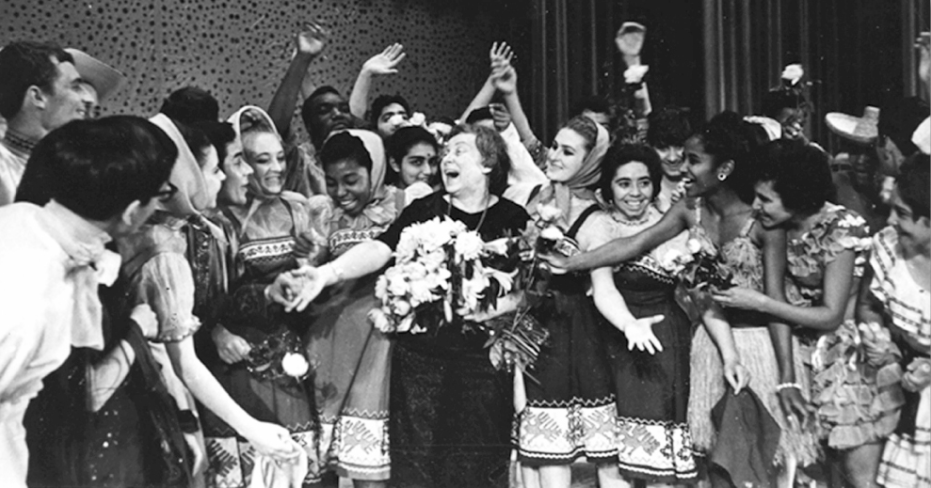
Photo credit (above photo): RIA Novosti
Photo credit (below photo): AFP/Pool/Vasily Maximov
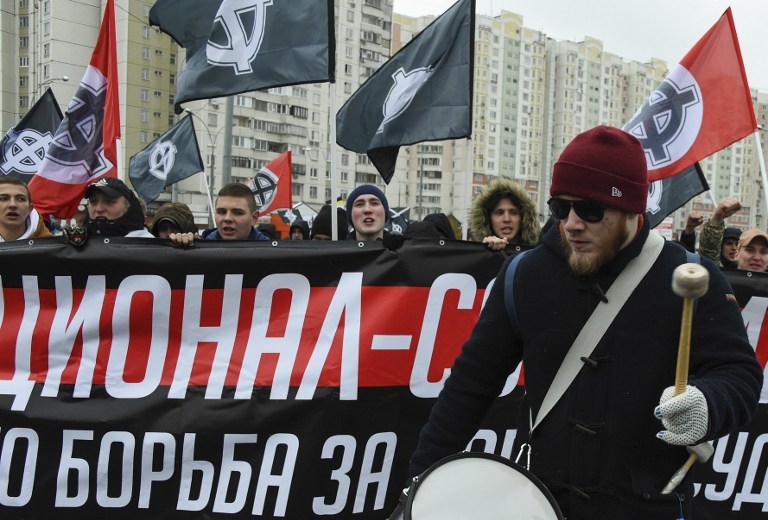
The lessons from all this that we must draw is that we need to fight to restore working class rule to all parts of the former Soviet Union, fight for socialist revolution around the world and fight like hell to ensure that the counterrevolution that destroyed the Soviet Union does not happen in socialistic China and the other remaining workers states. Moreover, to ensure that workers states created by new October Revolutions are not again collapsed – or even pushed a step backwards through bureaucratic degeneration – by hostile capitalist pressure, we need to complete any victory achieved by a workers revolution in a particular country by fighting urgently for other such revolutions throughout the globe – above all with the aim of destroying the tyranny of the imperial powers from within their own countries. Today, as the capitalist order grinds down the masses with plummeting real wages, ever-more insecure employment forms, skyrocketing rents and surging food, electricity and fuel prices, those committed to the fight for new October Revolutions can help build popular sympathy for such radical solutions in the course of advocating and mobilising class-struggle resistance to the attacks on the working class masses’ living standards.
To march towards socialist revolutions we must do everything possible to enhance the self-confidence and class struggle sentiments of the working classes and everything possible to weaken and discredit the imperialist ruling classes. Today that means standing for the defeat of the U.S., British, Australian and EU ruling classes’ proxy war against Russia. Let’s mobilise to demand: Stop the military aid to Ukraine! End all the sanctions against Russia! Let’s oppose NATO expansion and oppose NATO itself! We must also oppose all the imperialist schemes to leverage their current proxy war to further escalate their Cold War drive against socialistic China – Let’s unconditionally defend socialistic rule in China! And let’s build parties like Lenin’s Bolsheviks that will lead the working class masses to liberate all oppressed people and humanity itself from decaying capitalism and its final, most horrific stage – imperialism.
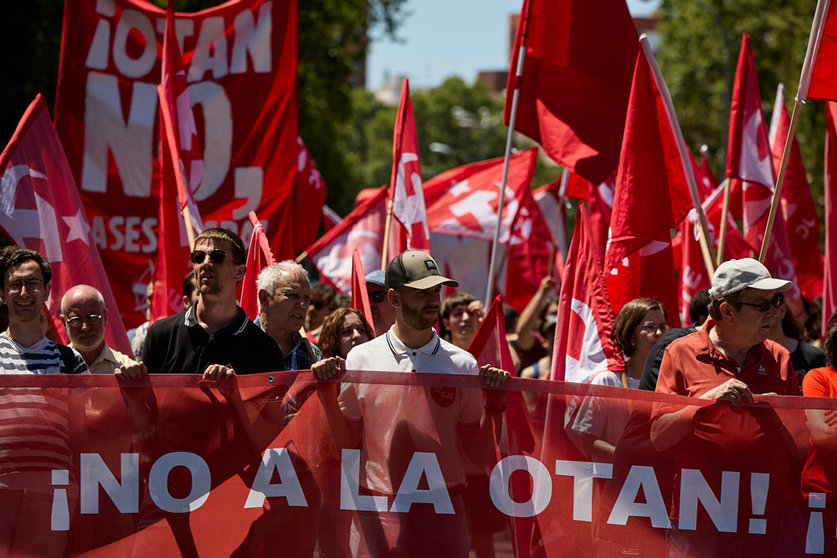
Photo credit – Jesús Hellín/dpa.
